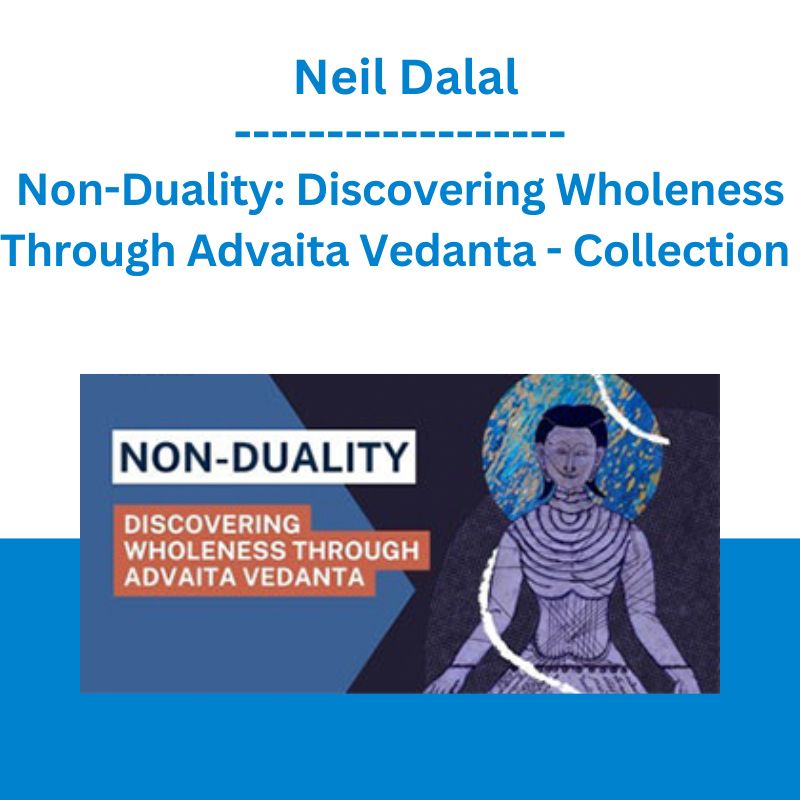*** Proof of Product ***
Exploring the Essential Features of “Non-Duality: Discovering Wholeness Through Advaita Vedanta – Collection – Neil Dalal”
The goal of oneness or nonduality is common to many spiritual traditions, but what is it, where is it, and who is it for? How can we even experience nonduality if it transcends subject-object relationships? This course unfolds the nature of nonduality through the traditional teaching methods of Advaita Vedānta. Advaita Vedānta inherited the wisdom of the Bhagavadgītā and the Upaniṣads—the world’s most ancient source of nonduality. The tradition provides a phenomenal methodology of self-inquiry to recognize that the immediate foundation of your self-experience is in fact nondual, unlimited, and the very source of happiness you seek.
Module 1: Nonduality and the Method of Advaita Vedānta
This module provides an overview of nonduality, explains the importance of Advaita Vedānta in the history of Indian spirituality/philosophy, and orients students to the proper way of engaging the Upaniṣads. The Upaniṣads are not “scriptures” in the common sense of that term, nor texts dealing with theory and practice; but are rather a direct means of knowledge to see one’s intrinsic nature as nondual. We will also explore our means and ends towards happiness, and why what we actually seek is freedom (mokṣa) from limitation.
Module 2: Spiritual Cultivation: Yoga, Dharma, and Īśvara
Unlike some systems of nonduality, traditional Advaita Vedānta does not dismiss the importance of yoga, meditation, devotion, and ethical practices. This module explains their importance and limitations, and then explores the Bhagavadgītā’s yoga of making life a prayerful offering in order to cultivate equanimity, acceptance, and compassion.
Module 3: Embodied Metaphysics and Pure Consciousness
Understanding consciousness is the heart of Vedānta’s nonduality. This module explores how the Upaniṣads map our minds and bodies through metaphysical models, and then employ this embodied metaphysics to discover pure consciousness—the intrinsic presence witnessing all experience. These methods comprise the core of Advaita’s contemplative practices. We will further explore why this consciousness is the basis of wholeness and love.
Module 4: Discovering Non-duality: Living while Liberated
Can the world of multiplicity be real if reality is ultimately nondual? Our final module analyzes the nature of the world and how it exists dependently on nondual existence. We will then learn how this existence is numerically identical to consciousness through the “great sentences” of the Upaniṣads like “you are that” (tat tvam asi). With this knowledge one can then abide in the fullness of nonduality and gradually integrate nondual wisdom into their emotional and intersubjective lives.
Students who take this course will:
Explore the intrinsic nature of nonduality (brahman) and what it means for the relationships between ourselves, world, and īśvara according to Advaita Vedānta.
Understand the importance of the Upaniṣads as a unique means for recognizing nonduality, and engage different Upaniṣads through traditional methodologies.
Understand how Advaita Vedānta’s yogic practices cultivate harmony with the world and dharma through virtues of equanimity and compassion.
Become familiar with Upaniṣadic metaphysical models, such as the five sheaths and five elements, to understand our embodied experience.
Learn how to distinguish our mental and emotional thought modifications from the underlying presence of consciousness, and why this presence is our genuine source of wholeness, happiness, and love (ānanda).
Learn to question the reality of the world we experience to find its underlying ground of existence, and why we are not separate from that existence.
Explore how knowledge of nonduality takes place, the nature of liberation (mokṣa), and how to integrate nondual wisdom into one’s emotional life.
Author
Neil Dalal
Neil Dalal is the Director of Religious Studies at the University of Alberta, where he teaches in both the Philosophy Department and Religious Studies Program. He received his PhD in Asian Cultures and Languages from the University of Texas at Austin where he specialized in Sanskrit and Indian philosophy, and an MA in East-West Psychology from the California Institute of Integral Studies. Dalal’s interests explore philosophy of mind, contemplative psychologies, and meditation practices found in classical South Asian Yoga systems. He grounds this research in classical Sanskrit texts and commentaries as well as their living traditions. Dalal’s current research focuses on the intersections of contemplative practices, textual study, and embodiment in Advaita Vedanta. He is the co-director of Gurukulam (The Orchard/Sony Pictures), a sensory-ethnographic study of a contemporary Advaita Vedanta community, co-editor of Asian Perspectives on Animal Ethics (Routledge Press), and has published articles in venues such as the Journal of the American Academy of Religion, Journal of Indian Philosophy, and Journal of Hindu Studies. Dalal is also a teacher within the traditional lineage of Śaṅkarācārya Advaita Vedānta. He spent several years living a monastic lifestyle in India while studying under the direct guidance of the renowned Advaita Vedantin, Swami Dayananda Saraswati, who gave him permission to teach in 2002.
Please see the full list of alternative group-buy courses available here: https://lunacourse.com/shop/









